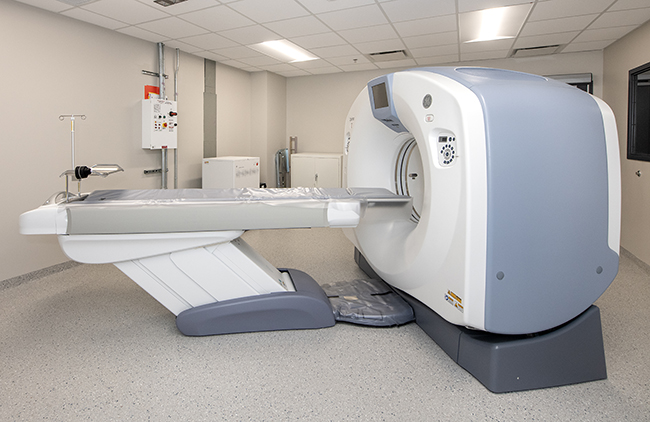Journey to a Healthy Weight
22 Jul 2015
Saving lives with minimally invasive bariatric surgery

By JESSICA SMITH
MANY AMERICANS WHO STRUGGLE WITH WEIGHT GAIN are able to drop those extra pounds through an effort to exercise regularly and establish a healthier diet. For the chronically obese, however, change doesn't come easily. A common indicator of obesity, the body mass index (BMI) is a measure of an individual's weight in relation to his or her height. More than one-third of adults in the United States are now classified as obese, with a BMI of 30 or above; the rate of morbid obesity, indicated by a BMI of 40 or above, hovers at 6.6% of the population.
So what is a chronically obese person to do? Obesity-related conditions, including heart disease, stroke and type 2 diabetes, are some of the leading causes of preventable death. For individuals with a BMI of 35 or more, bariatric surgery – often known as weight-loss surgery – is an excellent option in the treatment and reversal of these medical conditions. “As your weight goes up and your BMI gets higher, you tend to have one or more comorbidities, or additional conditions. At that point, surgery becomes a much safer option than not doing anything at all,” says Dr. William Borden Hooks, FACS, bariatric surgeon at New Hanover Regional Medical Center.
The most successful candidates for bariatric surgery are those who understand that surgery itself is not a quick fix. “The vast majority of our patients have had weight problems for years,” says Dr. James Harris, FACS, a gastrointestinal and laparoscopic surgeon with Coastal Surgery Specialists who performs bariatric surgeries at New Hanover Regional Medical Center. “They've tried weight loss pills, diets and exercise programs without long-term success. Our best candidates for surgery are non-smokers who have been able to lose weight, but can't keep it off.”
Even with surgery, sustained weight loss requires a significant lifestyle change. Like most providers offering bariatric surgery, Coastal Surgery Specialists has an extensive support program for both prospective and post-operative patients. Surgery candidates undergo a surgical evaluation and a psychological evaluation, and attend sessions with a registered dietician to learn more about a healthy postoperative diet. They are also encouraged to attend a monthly support group for potential and postoperative bariatric surgery patients.
“By the time candidates are finished with the program, they know what they need to do to succeed. It's a self-selecting process, as those who aren't as committed tend to drop out,” says Dr. Harris. Surgeons monitor patients' progress at 3, 6 and 12 months following the surgery, and many patients continue their sessions with the dietician and psychologist.
The Evolution of Bariatric Surgery
Over the last 15 years, new technology and the introduction of the pre- and post-operative counseling phases – which are now considered standard practice – have dramatically changed the practice of bariatrics. “Once the top universities in the country embraced the new results-driven methodology, the quality of care everywhere improved,” says Dr. Harris.
The surgery program at New Hanover Regional Medical Center has been designated as an American Society of Metabolic and Bariatric Surgeons (ASMBS) Bariatric Center of Excellence, averaging 275 bariatric surgeries each year. Studies found that surgeons and hospitals who served higher volumes of patients tended to achieve better results, with fewer mortalities, complications and re-operations.
Dr. David R. Miles, FACS, the Bariatric Medical Director of the program and a bariatric surgeon practicing with Miles Surgical Associates, has performed over 2,000 bariatric surgeries. “Two of the myths of weight loss surgery are that it's risky and that it doesn't work. In fact, the mortality rate of a gastric bypass is lower than the mortality rate for hernia surgery,” says Dr. Miles. “The weight loss is also durable over time. The majority of our patients maintain an average weight loss of 100 pounds.” Reassured by the impressive outcomes, most insurance companies now provide coverage not only for bariatric surgeries, but also for several postoperative visits.
Most bariatric procedures are now performed using minimally invasive laparoscopic techniques, which not only makes the surgeries safer, but also speeds recovery time. These techniques rely on the use of a laparoscope, a video camera attached to a thin metal telescope, to guide the surgeon. Instead of needing to make one large incision in the patient's body, the surgeon creates several small incisions. Specialized instruments are threaded through the incisions, allowing the surgeon to work on the patient's body indirectly.
“With the advances in technology, we can staple and sew intestines using incisions as small as 5mm,” says Dr. Hooks. “We gain access to the intra-abdominal cavity and inflate the patient with carbon dioxide gas in order to give us space in which to maneuver.” Given the small size of the incisions, patients have less pain, a quicker recovery, and a shorter hospital stay of 1-2 days. Minimally invasive surgery also reduces the risk of getting an infection or hernia.
So How Do Bariatric Procedures Work?
Bariatric surgical procedures cause weight loss either by restricting the amount of food the stomach can hold, reducing the absorption of nutrients, or a combination. The procedures also have a beneficial effect on gut hormones, the gastrointestinal hormones that control appetite by sending signals to the brain.
The most common bariatric surgeries are the gastric bypass, the sleeve gastrectomy, and the adjustable gastric band. By far the most popular is the gastric bypass procedure, in which the size of the stomach is reduced and a portion of the small intestine is bypassed, reducing absorption of calories and nutrients. By rerouting the food stream, the procedure produces hormonal changes that help the patient feel full and satiated.
With the sleeve gastrectomy procedure, approximately 80% of the patient's stomach is actually removed, leaving a narrow, cylindrical stomach (the “sleeve”) which reduces the amount of food that can be consumed. As with the gastric bypass, patients experience hormonal changes which positively impact their hunger and satiety. This procedure is gaining in popularity, and now accounts for approximately 50% of the bariatric surgeries performed at New Hanover each year.
The adjustable gastric band procedure uses an inflatable, adjustable band to portion off the upper section of the stomach, creating a small stomach pouch that allows patients to feel full by eating a smaller amount of food. In recent years, this procedure has declined in popularity, as it requires strict adherence to the postoperative diet and has proven less effective than the alternative procedures.
Long-Term Results: Less Weight and a Longer Lifespan
Patients generally tend to achieve their maintenance weight within a year of a gastric bypass, and within two years with the sleeve gastrectomy. On average, gastric bypass patients tend to lose between 60-80% of their excess weight, and sustain a durable weight loss of 50% of their excess weight. “Researchers report that patients who had a gastric bypass 10 to 15 years ago have kept the weight off,” says Dr. Harris.
For an overweight patient suffering from obesity-related medical conditions, the metabolic effects of bariatric surgery might even be better than the weight loss. In a meta-analysis of 135,246 patients, 80% of patients with diabetes who underwent gastric bypass or sleeve gastrectomies were able to resolve their condition.1
“Considering how devastating diabetes is, it's amazing the results we see,” explains Dr. Hooks. “Some people are already off their diabetes medicine by the time they leave the hospital.”
Depending on the procedure, bariatric surgery also resolves or improves many coexisting conditions, such as hypertension, reflux disease, high cholesterol and sleep apnea. Most importantly, for the morbidly obese, bariatric surgery improves life expectancy. One study found a 27% reduction in 15-year mortality rates in morbidly obese patients who underwent gastric bypass surgeries.2
“Undertaking this process is truly a life-changing event,” says Dr. Harris. “Nobody hugs me more than my bariatric surgery patients. Honestly, their weight loss is as much the product of their hard work as it is the procedure.”
For the morbidly obese, the age-old advice to eat right and get plenty of exercise may not even apply. “Studies show that less than 1% of the morbidly obese can exercise or diet their weight off,” says Dr. Miles. “I tell my patients, either you accept this weight as permanent and die early, or you have surgery, get the weight off, and improve your chances of living a long and happy life.” Sometimes, we all need a little help to reach our goals.
Footnotes
1. The American Journal of Medicine, March 2009; Vol. 122, Issue 3: 248-256.
2. Journal of the American College of Surgeons, October 2004; Vol. 199, Issue 4: 543-551.














